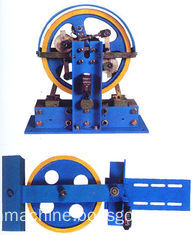Elevator Speed Governor Elevator Speed Governor, Elevator Speed Governor System, Elevator Speed Limiter Ningbo Xinda Elevator Traction Technology Co., Ltd. , https://www.nbelevator.de
There is a significant price difference between high-sulfur crude oil and low-sulfur crude oil. With the rise of international oil prices, such spreads have become more apparent. Compared with low-sulfur crude oil, high-sulfur crude oil was priced at US$4.60 per barrel in 2004 and expanded to US$5.1 in the first half of 2005. According to this calculation, if a medium-scale oil refiner chooses to process 2 million tons of high-sulfur crude oil each year, it can save raw material costs by 560 million yuan, and the benefits are considerable. Of course, the processing of high-sulfur crude oil requires higher costs in terms of energy consumption, material consumption, and operating costs. Converting one barrel of high-sulfur crude oil to processing will cost about US$1. Comparing the two, the processing of high-sulfur crude oil is still beneficial, especially in the current situation of high oil prices, refineries with high sulfur crude oil processing capacity can, to some extent, control the cost through the choice of crude oil varieties.
So, is it because companies are willing to process high-sulfur crude oil? What are the requirements for the processing of high-sulfur crude oil?
The reality is that high sulfur content in gasoline, diesel and other oil products will cause corrosion of engines and other equipment, so the sulfur content must be reduced during the processing of crude oil. However, the processing of high-sulfur crude oil is not an easy task, although a series of advanced technologies have been developed in this area, such as catalytic feedstock pretreatment technology, catalytic cracking gasoline hydrodesulfurization technology, diesel hydrorefining technology, and wax hydrocracking technology. And so on, and has been applied in the production of oil refining, so that the sulfur content in petroleum products is significantly reduced, but the corrosion of equipment by high-sulfur crude oil during processing is still a thorny issue.
Not only that, the impact of processing high-sulfur crude oil on the company is all-round, and all aspects of transportation, storage, and post-processing are subject to corrosion. The companies that have just started processing high-sulfur crude oil will almost always suffer from problems such as severe leakage of sulfur from the equipment, forced partial or total suspension of production of the equipment, and many oil refineries are discouraged. In spite of this, at present, China’s proposed and under construction new refinery units are designed according to the standard that can process high-sulfur crude oil, and the original refinery will also undergo corresponding technological transformation. This raises a new topic for refinery equipment manufacturers. Adapt to the need of processing high sulfur crude oil.
Due to the fact that China has not processed many high-sulfur crude oils in the past, the requirements for oil refining equipment to resist sulfur corrosion are not high, and it is now clearly necessary to raise this standard. The "Guidelines for the selection of major equipment for the design of key equipment for the processing of high-sulfur crude oil", prepared by the China Petrochemical Corporation and approved by the former State Economic and Trade Commission, are the new industry standards that must be followed in the design and manufacture of refinery equipment. The standard has clearly defined the design and selection of high-sulfur crude oil processing equipment such as atmospheric towers, vacuum towers, flash towers, and electric desalting tanks. Carbon steel, aluminized carbon steel, and dual-phase steel are required. Specific requirements for these materials have been made. If the aluminized carbon steel aluminized layer must be dense and uniform, as a pressure-bearing part and heat exchange tube bundle, its manufacturing, welding, inspection, etc. should be strictly examined to meet the requirements of the specified mechanical properties. When carbon steel is used for the equipment housing, pressure vessel steel should be used. This is due to carbon steel in the wet hydrogen sulfide environment, in addition to sulfide stress corrosion cracking, but also produce hydrogen induced bulge, hydrogen induced cracking, and the use of hydrogen-induced cracking pressure vessel carbon steel, due to steel With low sulfur and phosphorus content, damage to these devices can be avoided. In addition, relevant steel plates or pipes in oil refining equipment must also be subjected to hydrogen-induced cracking corrosion test, and based on factors such as the state, flow rate, flow state, and whether or not they are in the phase change location of the medium in the equipment, the local material and structure design of the equipment. Special treatments such as increasing the flow area, lowering the flow rate, increasing the wall thickness appropriately, adding baffles, and local material upgrades to prevent localized severe corrosion.
The corrosion protection of high-sulphur crude oil processing equipment is a major issue for related design, equipment manufacturing units, and oil refining companies, and must be highly regarded. The most important task at present is that all relevant units should revise their own existing material design standards in accordance with the latest industry standards. To analyze the possible consequences of equipment that has already been operating in this area, take measures to monitor, formulate an update plan, and actively promote the upgrading of oil refining equipment and material upgrades.
Elevator Speed Governor
product


Oil refining equipment must be adapted to high sulfur crude oil processing
The world crude oil supply trend is that resources are becoming increasingly poor. At present, the proportion of high-sulfur crude oil (sulfur content greater than 2%) accounts for about half of the total crude oil, and the Middle East where crude oil production capacity is most concentrated is also dominated by high-sulfur crude oil.